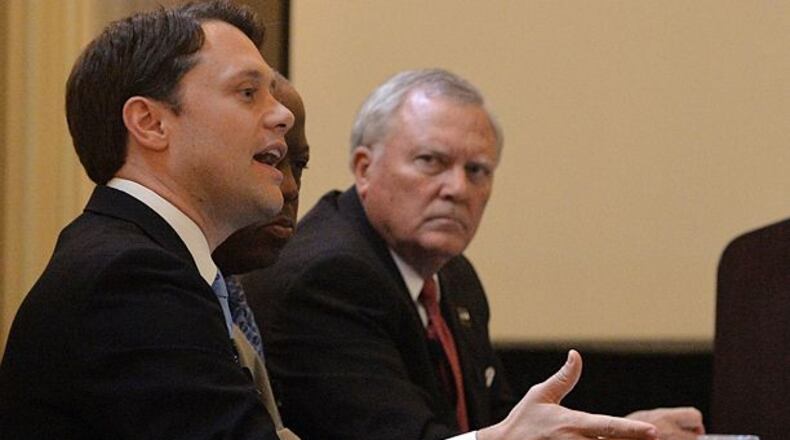Because biography is often destiny, politicians tend to keep an iron grip on their life stories.
So when 72-year-old Nathan Deal parts the curtains on a bit of family history, back to when he was still in the womb in 1942, it is time to pay attention.
The governor has often told friends that he was nearly a native of Soperton, a small town in southeast Georgia that now lies just south of I-16. Instead, Baby Deal was born 54 miles north, in Millen, Ga.
It seems that the governor’s schoolteacher father-to-be, Noah Deal, had run afoul of the Gillis family, which then ruled Treutlen County and would remain a force in Georgia politics the next four decades. I-16 bears the name of the patriarch, “Mr. Jim” Gillis.
“My family has experienced when politics becomes a dominant factor in public education,” Deal told a group of educators last week. “My family actually had to move on one occasion, because of internal politics within a local school system.”
The governor said much the same thing on Monday, at the close of an Atlanta meeting with his Democratic challenger, Jason Carter, sponsored by the Professional Association of Georgia Educators.
As he walked away from the event, the governor was asked to elaborate. He declined, out of “respect for the dead.” (Hugh Gillis, with whom Deal served in the state Senate, died last year at the age of 94.) But the governor threw one bone to the hounds of journalism.
“I’ve heard my parents say that I would have been born in a different place had my father retained his job. Let’s put it that way. Not that I’m complaining. I grew up in a very good location,” Deal said.
So what was the governor’s message? Given his history, we can assume that Deal wasn’t making a case for stronger teacher tenure policies in public schools.
The answer was in the meat of the PAGE event, a delightful confrontation between two of the three candidates for governor. (Libertarian Andrew Hunt was not invited.) Members of the audience were warned beforehand that they were witnessing a mere, lukewarm forum. Carter and Deal decided to debate instead, and for 45 minutes the pair went toe-to-toe over education policy.
Carter, a state senator, was eventually forced to explain why, while he has attacked Deal for woefully underfunding education in Georgia, he has voted for three of the Republican governor’s four annual state budgets.
Earlier votes, the senator said, were cast in a spirit of “bipartisanship.” But Carter said a special task force on education that he and a handful of other Democrats organized, visiting schools across the state, changed his thinking. “After you’ve done that, after you’ve talked to enough people, I couldn’t justify voting for that budget ever again,” he said.
Fortunately, the scales fell from Carter’s eyes just as he announced his run for governor.
On the other hand, the GOP incumbent was asked to explain comments made a few days earlier, in the presence of Louisiana Gov. Bobby Jindal. Deal said legislators should consider a system, pioneered by Jindal in his state, that allows the state to take control of struggling public school systems and convert them to more flexible charter systems.
On Monday, Deal appeared to back-pedal. “We have not put anything like that in place. And it seems like the media took this as an endorsement of that concept,” the governor said.
But it was back-pedaling in appearance only. The governor only promised not to do anything rash. “I’m not going to adopt anything that’s not going to produce quality results,” Deal said. “I’m willing to listen to anybody’s ideas.”
Since the governor’s decision to remake the DeKalb County Board of Education, after one of the state’s largest school systems was threatened with a loss of accreditation, Deal has repeatedly said the state needs to be able to intervene in such cases earlier.
Academic performance needs to be a trigger, rather than accreditation, Deal has said.
For the record, Carter was critical of the idea. “We have lurched from year to year, from new idea to new idea,” he said. “That kind of constant change is the opposite of what we need.”
But the real obstacle for Deal would be Georgia’s 180 school systems and a rallying cry of local control. This is where Noah Deal enters the picture.
The ouster of Deal’s schoolteacher father seven decades ago is personal proof to the governor that local politics is often the problem in education, not the solution – and so should not be sacrosanct.
“My family had to move because of politics in education. I don’t want educators of today or tomorrow to have to deal with that kind of situation,” Deal said to that PAGE audience.
Deal has already promised to modernize the state funding model for education in Georgia. If, that is, he can survive the challenge from Jason Carter.
Giving the state a stronger hand in local education matters could become part of those second-term negotiations – but would require a governor in a “damn-the-torpedoes” frame of mind.
Or one who is out to do right by his dad. Which is why biography matters.
About the Author
The Latest
Featured




